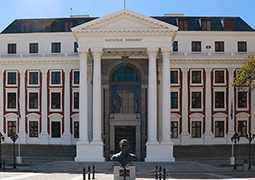
The National Assembly recently debated Freedom Day on the theme “Consolidating our democratic gains by giving enhanced meaning to our constitutional rights through the building of a more equitable society”.
ANC Member of Parliament and Chairperson of the Portfolio Committee on Police Ms Tina Joemat-Pettersson opened the debate by giving a brief history of the day’s origin in 1994 when the country held its first general election to usher a new democratic government and end many years of apartheid. She said while Freedom Day was originally about the ability to choose political leadership, the second phase is about economic freedom and the struggle against poverty.
Ms Joemat-Pettersson also used the opportunity to highlight the establishment of key institutions such as the Electoral Commission, the South African Human Rights Commission and the Commission on Gender Equality as indicators of the democratic government’s commitment to safeguard the freedoms gained on 27 April 1994.
“We have managed to advance the rights of women and promote human rights, integrated schools that used to be racially segregated and ended diplomatic isolation,” she said. However, she warned that the gains of 1994 are being undermined by corruption, gender-based violence (GBV) and crime. “Let us unite to defend the gains of democracy by fighting the scourge of corruption and GBV in our country,” Ms Joemat-Pettersson said.
Other NA member also raised the need for a social compact between labour, government and business to find solutions to the complaints of workers. Ms Siviwe Gwarube of the Democratic Alliance found no reason to celebrate Freedom Day when citizens still battle poverty, hunger and unemployment. “Our transition to democracy signalled a new beginning for many South Africans who were oppressed for years, but that dream of freedom soon turned into a nightmare of unemployment and poverty. No South African is free when there is still poverty, we need to be free from a life of indigence,” she said.
The Inkatha Freedom Party (IFP) also raised the spectre of hunger, poverty and corruption, saying these and other social ills undermine the freedoms gained in 1994. Mr Narend Singh, the party’s Chief Whip in the National Assembly questioned “how can we speak of freedom when thousands of children are hungry and uncertain when they are going to get their next meal. The hunger, high levels of crime and corruption are undermining our freedoms. Every rand lost to corruption translates into another child going to bed hungry,” said Mr Singh.
Ms Omphile Maotwe of the Economic Freedom Fighters said the 28 years of political freedom is “a hollow victory for the poor and the unemployed” in South Africa. “It has been 28 years since blacks were allowed to vote to mark the end of formal apartheid, but many remain jobless and homeless. The freedom is meaningless to the 35 percent who can’t find jobs, the youth need quality education and jobs,” she said.
The EFF MP also blamed the governing party for the slow progress in the land reform programme since 1994. “In 1994 the ANC promised to transfer 30 percent of agricultural land to blacks, but only 10 percent was transferred and people are dying waiting for land.”
Another party questioning the significance of celebrating freedom in the midst of poor service delivery, GBV and corruption, was the Freedom Front Plus. “No democratic gains will mean anything if there are no jobs, no reliable electricity supply, high levels of GBV and poor service delivery,” argued FF Plus Member of Parliament Ms Heloise Denner.
“How are we free when women cannot walk to the shop without looking over their shoulder? How can we celebrate freedom when we have a huge number of hungry children who don’t even know where to get their next meal? If government does not prioritise service delivery, we are not free, we just had our jailer replaced.”
Reverend Kenneth Meshoe of the African Christian Democratic Party told the National Assembly sitting that we are regressing instead of progressing as a nation. How can we celebrate freedom when our human dignity is being undermined by poverty, unemployment and poor service delivery, he asked.
The Minister of Sports, Arts and Culture, Mr Nathi Mthethwa, said the process of building a united, non-sexist, non-racist democratic society is continuing through various initiatives such as uprooting illiteracy, promoting access to health, decent human settlements, water, sanitation and electricity.
Sakhile Mokoena
4 May 2022

